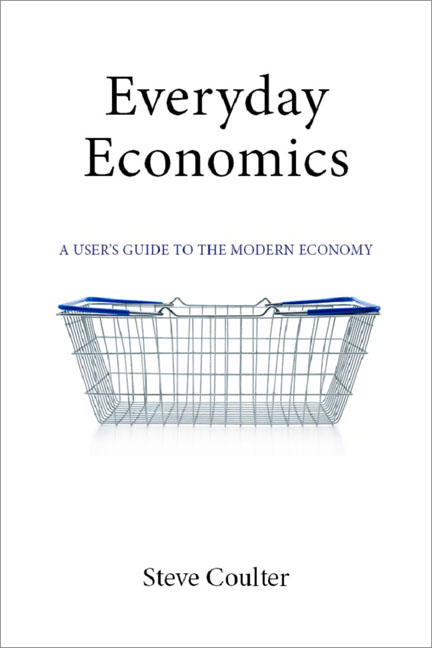Book contents
- Frontmatter
- Contents
- Preface and Acknowledgements
- 1 Economics: What is it Good For?
- 2 Knowledge is Power: Education and Training
- 3 Let’s Get Busy: Work and Occupations
- 4 Get Well Soon: Health and Healthcare
- 5 Making the World Go Around: Money, Banking and Personal Finance
- 6 Home Sweet Home: The Housing Market
- 7 Shop Till You Drop: Shopping and Consumption
- 8 From Cradle to Grave: Benefits and Welfare
- Index
7 - Shop Till You Drop: Shopping and Consumption
Published online by Cambridge University Press: 09 August 2023
- Frontmatter
- Contents
- Preface and Acknowledgements
- 1 Economics: What is it Good For?
- 2 Knowledge is Power: Education and Training
- 3 Let’s Get Busy: Work and Occupations
- 4 Get Well Soon: Health and Healthcare
- 5 Making the World Go Around: Money, Banking and Personal Finance
- 6 Home Sweet Home: The Housing Market
- 7 Shop Till You Drop: Shopping and Consumption
- 8 From Cradle to Grave: Benefits and Welfare
- Index
Summary
I like nice things.
Elton JohnKey questions
• What are the key influences on consumer behaviour?
• From factory to high street: how do global supply chains respond to our changing needs and tastes?
• How does what we buy drive the national and international economy?
• How are technology and the internet changing the way we shop?
Summary
We live to shop. Consumer spending comprises a major part of the economies of most rich countries, but consumers’ behaviour is unpredictable and it can wreck or rescue the economy. Besides shops themselves, huge distribution chains and freight transport networks, employing millions of people, are dependent on customers opening their wallets. Consumers themselves are the targets of advertising, marketing and other forms of persuasion by retailers chasing their business. But is the growing scale and diversity of retail operations and global supply chains – while, admittedly, driving down prices and widening choice – being bought at the expense of dubious ethical standards? Some argue that our obsession with low prices in shops and supermarkets is harming workers in developing countries and cruel to animals. It could also lead to the extinction of the “high street” as consumers flock to out-of-town malls or use the internet. Do the benefits of these changes outweigh the costs?
Key topics and theories covered
The “affluent society” and consumer choice; globalization and global value chains in retail; the environmental and ethical impact of supermarkets and cheap clothing; new ways of shopping.
The economics of shopping and consumption
Shopping is one of our favourite activities and is therefore something of keen interest to economists. We certainly love to splash the cash. Private consumption spending in most advanced economies comprises a half to two- thirds of GDP and consumer sentiment is considered a critical indicator of economic vigour. Consumers spent $43 trillion worldwide in 2015, a 35-fold increase on 1965. Americans, who account for more than a quarter of this total, lavished $274 billion on new cars and trucks, $24 billion on dishes and flatwear, $44 billion on breakfast cereals and $60 billion on their pets.
- Type
- Chapter
- Information
- Everyday EconomicsA User's Guide to the Modern Economy, pp. 145 - 170Publisher: Agenda PublishingPrint publication year: 2017



